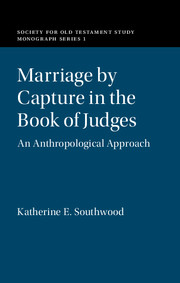Book contents
- Frontmatter
- Contents
- Preface
- 1 Methods, Considerations and Recent Approaches to Judges 21
- 2 Contextualised Outline of the Causes for and Consequences of Marriage by Capture
- 3 Virginity, Marriage and Rape in the Hebrew Bible
- 4 Judges 21 as an Example of Marriage by Capture in the Hebrew Bible
- 5 Marriage by Capture within an Ethnic Narrative: Judges 21 as a Social Critique of Superficial Unity in the Persian Period
- Conclusion
- Bibliography
- Author Index
- Thematic Index
5 - Marriage by Capture within an Ethnic Narrative: Judges 21 as a Social Critique of Superficial Unity in the Persian Period
Published online by Cambridge University Press: 30 March 2017
- Frontmatter
- Contents
- Preface
- 1 Methods, Considerations and Recent Approaches to Judges 21
- 2 Contextualised Outline of the Causes for and Consequences of Marriage by Capture
- 3 Virginity, Marriage and Rape in the Hebrew Bible
- 4 Judges 21 as an Example of Marriage by Capture in the Hebrew Bible
- 5 Marriage by Capture within an Ethnic Narrative: Judges 21 as a Social Critique of Superficial Unity in the Persian Period
- Conclusion
- Bibliography
- Author Index
- Thematic Index
Summary
Unity or Fragmentation in Judges 21?
We have argued that marriage by capture probably did exist in Ancient Israel, partly as a consequence of the rigid marriage systems which were in place. Despite a wide range of forms of marriage, the expectation that women were virgins prior to marriage was emphasised as was the connection of a father's, and indeed, a family's, honour and wealth to marriage. We have also suggested that Judges 21 provides two episodes which portray marriage by capture and which seek to communicate to early audiences the problems concerning the unity of Israel given the behaviour and attitudes of the Benjamites within the narrative. Especially important to the argument thus far has been the connections between Judges 21 and the narrative concerning intermarriage in Ezra 9–10, the emerging theme of ethnicity in Judges 21, and the demonization of the Benjamites within the narrative as the indigenous ethnic Other (just as the ‘people of the land’ are interpreted as foreigners in Ezra's intermarriage episode). In this chapter, we will address the contorted issue of unity in Israel within the narrative, and what implications the narrative has for the question of unity within the postexilic period more generally. We will begin by addressing whether unity can be found within Judges 21 and then proceed to examine the connections between marriage by capture and ethnic tradition. Finally, we will investigate the ways in which the narrative may have influenced original audiences.
There is a sharp division between the reactions of scholars when the narratives of marriage by capture in Judges 21 are analysed. Two dominant, yet polar opposite, conclusions exist. First, that by the end of the narrative the repeated desire for unity which occurs in Judges 21 is fulfilled. The second conclusion is that the narrative ends in disunity and fragmentation. We shall begin by exploring the first, a suggestion reached by Noth when he suggested that the narrative is about community and cooperations between the Gesamtleben of the twelve Israelite tribes (Noth 1930). Similarly, Nidith argues that ‘the unity-theme [is] central to the narrative; the tale builds to this theme in a stylistically elegant way. Without this theme the work loses its raison d’être’ (Niditch 1982:373).
- Type
- Chapter
- Information
- Marriage by Capture in the Book of JudgesAn Anthropological Approach, pp. 189 - 231Publisher: Cambridge University PressPrint publication year: 2017



